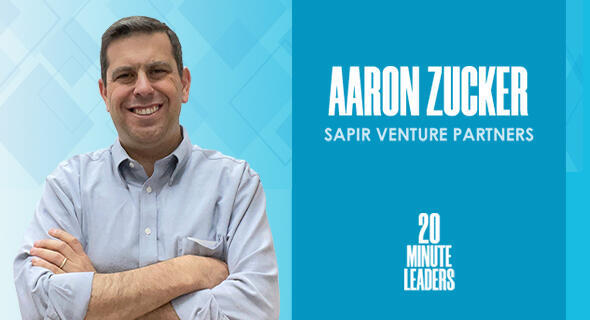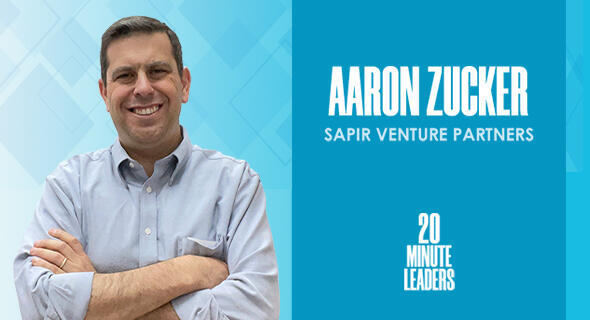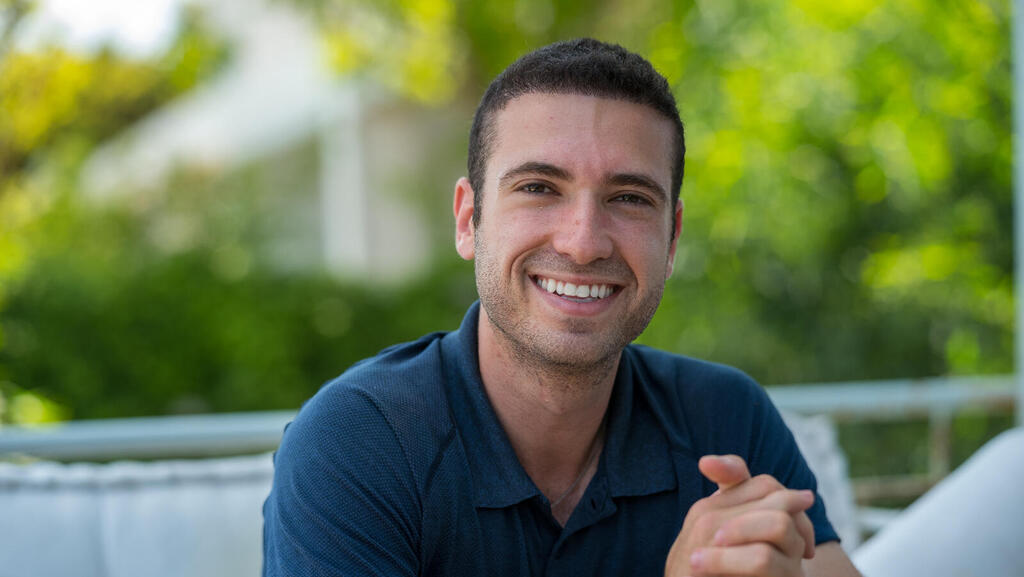
20-Minute Leaders
"Our diligence process is creating that mentorship.”
Before committing to full-time investing, founder and managing partner at Sapir Venture Partners Aaron Zucker was compelled to ask himself what he would add to the ecosystem
Before committing to full-time investing, Aaron Zucker was compelled to ask himself what he would add to the ecosystem. He answered by building a pitch deck for himself, realizing that he could bring a lot of value through mentoring the founders he invested in. This led him to launch Sapir Venture Partners, which has a culture based on mentorship that he thinks will change the VC world. The firm performs due diligence by beginning a mentoring relationship with the founders to see how well they can work together. Zucker explains that this involves talking through many different aspects of the business for the purpose of getting to know the team and understanding how they think and how they respond to challenges. Zucker has experience with law, entrepreneurship, academia, and volunteering, and he shares that the common thread through his journey has been making an impact through helping others to achieve.
Throughout your career, what's been guiding you?
I would say the common thread is definitely about helping people achieve. That's my own understanding of where I can be most influential and impactful in the world: to help others realize their dreams.
I've had lots of opportunities at those different junctures to really be able to pick the people I do it with. I feel privileged that I've met those people. They have been impactful mentors to me. Today, most of my work is focused on being that type of person for the next generation of founders.
A crazy story: I had graduated law school at The Hebrew University. Here in Israel, you have to do a year of your internship. I had committed to a firm that actually I thought I was going to be working in the space of startups, intellectual property, and venture capital. That firm, right when I was graduating, had split up. The group that was doing all the work that was interesting to me didn't take any of the interns. The larger group kept all the interns, and I was doing work that I didn't want to do. I was there for three days. I realized that culturally, it was a terrible fit.
I went back to the Bar Association and they said, "If you can't find an alternative internship in two weeks, then you are going to lose the cycle." I would get thrown off track for my career. I interviewed in three places, and one of them asked me to step in. It turned out to be an amazing experience. If I had not taken the risk of walking away from the other place and putting my career trajectory on hold, I would never have met them.
What lesson are you taking with you from that to the rest of your journey?
The idea of being bold, taking risk: that's what we do today as investors. We are taking that risk on other people. In that case, I was taking a risk on myself.
How does investing and working in the tech industry satisfy your passions today?
One of the things I volunteer as is an EMT. You are meeting people in crisis. It could be a very stressful environment. My father-in-law said, "One of the reasons I continue to do that is because you can see your impact in a more immediate way." When you are investing in super early-stage companies, it could be a decade before you see their returns, before you can see the impact and results.
The key to having a great journey is the people that you go on that journey with. We are asking founders to let us join them on their journey. In a small way, we are going to help.
The foundation of Sapir Venture Partners, tell me about that.
Sapir spun out of my angel activity; I had started an angel fund. Basically, people who had invested with us as founders had made some money with us, not a lot, and were willing to give me another chance while I was seeing these amazing opportunities. We were writing very small checks. But when I looked back after a couple of years, we had 12 companies in the portfolio and they were doing pretty well, and I was thinking about what's next. I was suggested that I go full time on investing. I said, "Why do we need another venture capital fund? What do I add into this ecosystem?" I went and built a pitch deck for myself, just looking at the ecosystem: where do we add value? The answer actually came to me from a very specific story.
We were very early in Tomorrow.io. I was spending time with them working on their deck, go-to market, pricing, business model. Then they invited me to join that round, which was an amazing opportunity. When I thought about it afterwards, we clearly added some value there. We had value to add from our experience to mentor them. That's where we hinged on this mentorship-driven investing. Actually, our diligence process is creating that mentorship. We try to add value before we even invest capital, which means we are working with founders for a longer time.
Tell me about the mentorship process with the founders. How do you build that trust?
There are two different paths. If we are not the lead investor, obviously, we want the lead to be somebody we trust and we know. Then they know where we specifically can add value, and that'll be where most of our conversation is around. It could be around tech development, the process of spinning out of a university lab, the go-to market, hiring.
When we are the lead, which we definitely like to do, it's a much closer relationship. With companies that we sit on boards, we speak to the CEOs, the founders, every week. We tell them, "This is your time to talk to us about whatever you want." My goal there is to be a de-stressing element. The way to build that is by getting to know how they think and for them to get to know how we think. So we'll often spend a lot of time thinking about their technology development plan, their team development plan, and their financial plan. We don't know how to build their technology and their business better than they do. That allows us to get into their minds and understand how they think, to understand their assumptions, challenge their assumptions, and see how they respond. We are trying to be part of the team. In order to have that team be effective, we need to get to that period of storming where we are not in agreement so that we can get to that norming and figure out how we will work together even though we are not in agreement.
It sounds like you are prioritizing that foundation of trust to be a cornerstone of the due diligence process.
Founder Collective, I think, said it best. They want to be the investors that they wish they had when they were founders. That's definitely who we want to be. We've been in the trenches. If you just are all hype and fluff and “it's all good,” like we saw last year, it's going to be very hard to work together in the trenches when times get tough. We've had multiple companies now where the founders were the ones that did not get along. Being able to come in and be that third party to mitigate is a valuable thing to be able to do. Not every investor can do that.
What is the vision that you are working toward?
A question we get a lot from potential LPs and LPs is about how we scale. We are not a fund. We believe ourselves as a firm. We are building a culture that will change venture. It's a culture that puts us in the shoes of the founders. It also means that we often invest in "underrepresented founders." Not enough companies are getting spun out of the universities. But also in the US. People tend to forget that Israeli founders in the US are still immigrants and they are still going to be dealing with a lot of challenges that the immigrants go through. We want to be that bridge and continue to do that. As a firm, we hope to be able to grow with additional people. We've added on three founder advisors who are now advising the new founders we invest in. It's been a great journey so far, but we really are just at the beginning.
Michael Matias, Forbes 30 Under 30, is a Venture Fellow at Innovation Endeavors as well as investment Venture Partner at Secret Chord and J-Ventures. He studies Artificial Intelligence and Human-Computer Interaction at Stanford University, and was an engineer at Hippo Insurance. Matias previously served as an officer in the 8200 unit. 20MinuteLeaders is a tech entrepreneurship interview series featuring one-on-one interviews with fascinating founders, innovators and thought leaders sharing their journeys and experiences.
Contributing editors: Michael Matias, Megan Ryan














